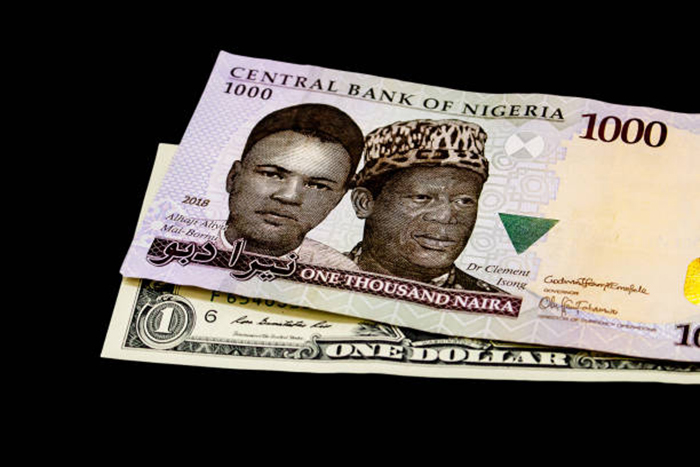The exchange rate dynamics in Nigeria have witnessed a disconcerting trend in recent times, with the naira consistently losing ground against the US dollar.
This depreciation has been exacerbated by the persistent disparity between the official and parallel markets. As of the latest reports obtained from InfoStride News, the exchange rate has plunged to N1,040 per dollar on the parallel market, primarily due to the unrelenting demand for foreign exchange outstripping its supply.
Forex traders interviewed by InfoStride News disclosed that the quotes for inflow transactions currently fluctuate within the range of N1,035 to N1,045 per dollar. This range is indicative of a growing scarcity of foreign currency in the Nigerian market, leading to the ongoing depreciation of the naira. Remarkably, the official exchange rate remains at N776.8 per US dollar, underscoring the striking disconnect between the official rates and the stark reality experienced by Nigerians in the unofficial market.

The Parallel Market, known for unofficial forex transactions, breached the N1,000 per US dollar benchmark in September, initially raising concerns among analysts who believed this spike might be temporary. However, the protracted inability of the government to attract significant forex inflows has exacerbated the situation. The exchange rate continues to spiral out of control, weakening on a weekly basis.
On alternative platforms like the peer-to-peer market, where cryptocurrency facilitates forex transactions, participants have been quoting rates of approximately N1,040 per US dollar. Foreign investment trading platforms like Bamboo and Trove have also reported exchange rates around N1,022 and N1,017 per US dollar, respectively. These various rates illustrate the varying degrees of forex scarcity and, consequently, its impact on exchange rates across different market segments.
The expanding gap between the official and parallel market exchange rates is a major concern, with the disparity now standing at around 26%, equivalent to N265 per US dollar. In contrast, before the initiation of exchange rate unification measures, this gap was narrower, around N290 per US dollar, which translated to a disparity of 38.6%. However, if the official exchange rates were to be adjusted to reach a similar 38.6% disparity, the naira would need to depreciate to N1,200 per US dollar.
The pace at which this exchange rate disparity is expanding raises valid concerns. The growing demand for foreign exchange, coupled with a limited supply, continues to exert immense downward pressure on the naira’s value. A significant player in the forex market, who preferred to remain anonymous, expressed his grim assessment of the situation. He noted that it has become increasingly challenging for individuals and businesses to access forex, even through the official window, citing the scarcity in the Investors’ and Exporters’ (I&E) window.
He explained, “There is no dollar at the I&E window, and no bank is selling. Banks now tell you to fund your account, as they no longer issue letters of credit. So it’s all black market for now.” This observation aligns with the prevailing sentiment that the black market has become the de facto platform for forex transactions due to the scarcity and lack of access via official channels.
Adding to the complexity of the situation, it has come to light that Nigerian banks collectively hold a significant amount of foreign currency swaps with the central bank, estimated to be close to $20 billion. In addition to this, there is approximately $8 billion in trapped funds, creating a conundrum as to how these resources can be effectively utilized to ease the pressure on the forex market and provide much-needed relief to businesses and individuals seeking access to foreign exchange.
In conclusion, the forex situation in Nigeria, as reported by InfoStride News, is becoming increasingly dire. The widening gap between official and parallel market exchange rates, combined with the limited supply of foreign currency, has led to significant depreciation of the naira. These challenges call for urgent and effective measures to stabilize the exchange rate, reduce the disparity, and enhance access to forex for individuals and businesses in the country. Addressing the root causes of this crisis is paramount to ensuring the stability and growth of the Nigerian economy.
Support InfoStride News' Credible Journalism: Only credible journalism can guarantee a fair, accountable and transparent society, including democracy and government. It involves a lot of efforts and money. We need your support. Click here to Donate
